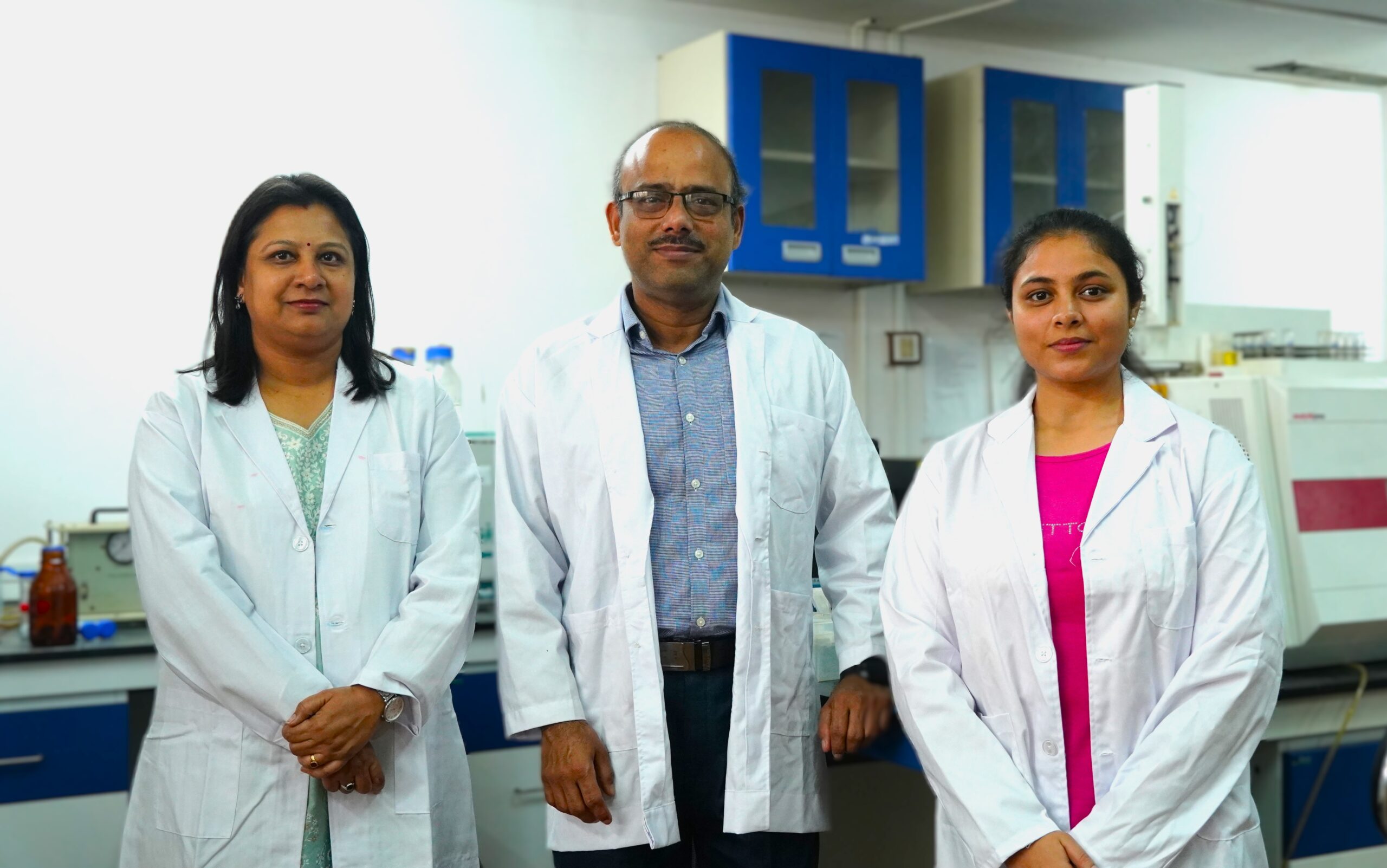Indian Institute of Technology Guwahati researchers have developed a sustainable and cost-effective method to remove toxic pollutants from industrial wastewater using biochar made from fruit waste. Led by Dr. Gopal Das, Professor, Department of Chemistry, the team has shown how biochar derived from fruit waste such as Pineapple crowns and Mosambi (sweet lime) fibers can efficiently absorb nitroaromatic compounds, a class of hazardous chemicals commonly found in wastewater from industries such as dyes, pharmaceuticals, pesticides, and cosmetics.
The findings of this research have been published in prestigious journal, Chemical Engineering Science, in a paper co-authored by Prof. Gopal Das along with his research scholar Ms. Neha Gautam, and Dr. Deepmoni Deka, Senior Technical Officer, Centre for the Environment, IIT Guwahati.
Nitroaromatic compounds pose a significant threat to both human health and ecosystems. These chemicals are widely used in various industrial applications, but their continuous discharge into water bodies leads to severe pollution. Once in the environment, they persist for long periods, accumulating in aquatic systems and affecting both marine life and human populations. Exposure to these compounds has been linked to toxicity, cancer, and genetic mutations, making their removal from wastewater a critical challenge.
Existing treatment methods, including catalytic degradation, electrochemical processes, and biological treatments, often require expensive catalysts, specific environmental conditions, or complex equipment. Some of these techniques also generate harmful by-products, adding to the environmental burden. The need for a low-cost, efficient, and environmentally friendly alternative has driven researchers to explore novel approaches to wastewater treatment.
To address this problem, the IIT Guwahati research team investigated the potential of biochar, a carbon-rich material produced from fruit waste through a process called pyrolysis. This process involves decomposing organic materials at high temperatures in the absence of oxygen to produce char, gas, and liquid products. The team chose pineapple crowns and mosambi fibers, which are usually thrown away as waste. They transformed these materials into two types of biochar: ACBC (Ananas Comosus Biochar) and MFBC (Citrus Limetta Biochar). These biochars were then tested for their ability to remove 4-nitrophenol, a widely recognized nitroaromatic pollutant found in industrial wastewater.
ACBC achieved a 99% removal efficiency for 4-nitrophenol, while MFBC removed nearly 97% of the contaminant. Additionally, the biochars also demonstrated exceptionally fast adsorption rate, reaching equilibrium within just five minutes. This rapid uptake is a major advantage over conventional methods, which often require longer processing times and greater energy input. By significantly reducing the time needed for pollutant removal, this method enhances both efficiency and practicality for large-scale applications.
Another important aspect of the study was the recyclability of the biochar. Both ACBC and MFBC retained their high performance over multiple cycles, meaning they can be reused several times without losing effectiveness. This feature makes the approach not only sustainable but also economically viable for industries looking for long-term wastewater treatment solutions.
Speaking about the significance of the research, Prof. Gopal Das, Department of Chemistry, IIT Guwahati, said, “This work demonstrates how waste materials can be transformed into valuable resources for environmental protection. By using fruit waste to tackle industrial pollution, we are not only addressing water contamination but also promoting a circular economy approach to waste management.”
The potential applications of this method extend beyond industrial wastewater treatment. Biochar-based filtration systems could be integrated into water purification setups for rural communities, providing an affordable way to remove harmful organic contaminants from drinking water. The same technology could also be applied to environmental remediation efforts, helping restore polluted water bodies and improve soil quality in areas affected by industrial discharge. With its combination of low-cost production, high efficiency, and sustainability, this approach offers a promising alternative to conventional wastewater treatment technologies.
As the next step of prototype development, the developed method will undergo lab-scale testing, followed by field trials and market validation, before progressing to full-scale commercial production. To facilitate successful commercialisation, the research team aims to collaborate and engage with key stakeholders who can provide the necessary support in bringing the product to market.
###
ABOUT IIT GUWAHATI
Indian Institute of Technology Guwahati, established in 1994, completed 25 years of glorious existence in 2019. At present, the Institute has eleven departments, nine interdisciplinary academic centres and five schools covering all the major engineering, science, healthcare, management, and humanities disciplines, offering BTech, BDes, BSc(Hons), MA, MDes, MTech, MSc, MS(R), MBA and PhD programmes. The institute offers a residential campus to 455 faculty members and more than 8,600 students at present.
IIT Guwahati has retained the 7th position among the best engineering institutions of the country, 9th position in ‘Overall’ and 10th position in ‘Research’ Categories in the ‘India Rankings 2024’ declared by the National Institutional Ranking Framework (NIRF) of the Union Ministry of Education.
IIT Guwahati has achieved rank 87 in the SDG 9 (Industry, Innovation, and Infrastructure) globally in the Times Higher Education (THE) Impact Rankings 2024 and is the only academic institution in India that occupied a place among the top 100 world universities – under 50 years of age – ranked by London-based Times Higher Education (THE) in 2014 and continues to maintain its superior position even today in various International Rankings. IIT Guwahati gained rank 32 globally in the ‘Research Citations per Faculty’ category and overall 344 rank in the QS World University Rankings 2025.
Among other frontier areas of research and innovation, IIT Guwahati is working towards augmenting critical science research initiatives in Genomics, Developmental Biology, Health Care and Bioinformatics and Flexible Electronics, among numerous other areas.

